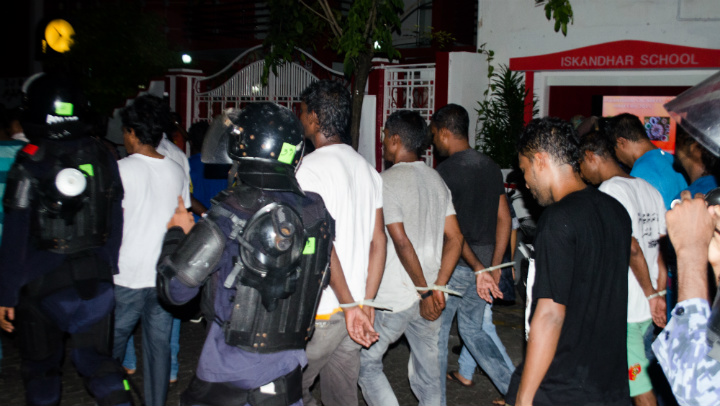The Thulhaadhoo island council has defied orders from the Local Government Authority (LGA) to withhold the monthly salary of a councillor suspended for attending a mass anti-government protest on May 1.
The council informed the LGA last week that the authority’s order was contrary to relevant laws and regulations. Unless a court of law rules otherwise, the Thulhaadhoo council said it would be following an “unconstitutional order” if it enforced the decision.
Thulhaadhoo council member Ziyau Rasheed Ibrahim was among several councillors suspended for two months without pay following their arrest from the May Day protest.
The council noted that Ziyau was no longer under arrest and that the constitution guarantees “fair wages and equal remuneration for work of equal value”.
The LGA’s chair, home minister Umar Naseer, had ordered the council secretariat not to pay Ziyau as he had been arrested from an “unlawful assembly.” Naseer had also asked the anti-corruption watchdog to penalise any councillors who had traveled to the capital on state funds.
According to the main opposition Maldivian Democratic Party (MDP), some 300 of its 450 island and atoll councillors had taken part in the protest.
Ziyau told Minivan News today that he had taken a leave of absence and traveled to Malé with his own money.
“I support the decision made by the council as the LGA has no reason to suspend me,” he said.
Vice president of the Thulhaadhoo council, Ahmed Rasheed, said the council believed the provision the LGA referred to in its letter was irrelevant to Ziyau’s case.
The decision not to enforce the LGA order was approved unanimously.
LGA media officer Mohamed Azmeen said the Thulhaadhoo council’s decision will be addressed at the next board meeting due to take place on June 24 and suggested contacting the home minister for further details.
Naseer was unavailable for comment at the time of publication.
However, Rasheed said the LGA has replied to the council’s letter, advising the council to challenge the legality of the order at court.
Ziyau meanwhile revealed that he is facing charges of obstruction of police duty.
“They have sent me a summons today asking me to attend court for a hearing on some charge against me. A second chit said I would be given further details at a meeting,” he said.
Earlier this month, MDP island and atoll councillors in Noonu atoll decided to chip in to pay the salary of suspended Holhudhoo councillor Hussain Habeeb.
